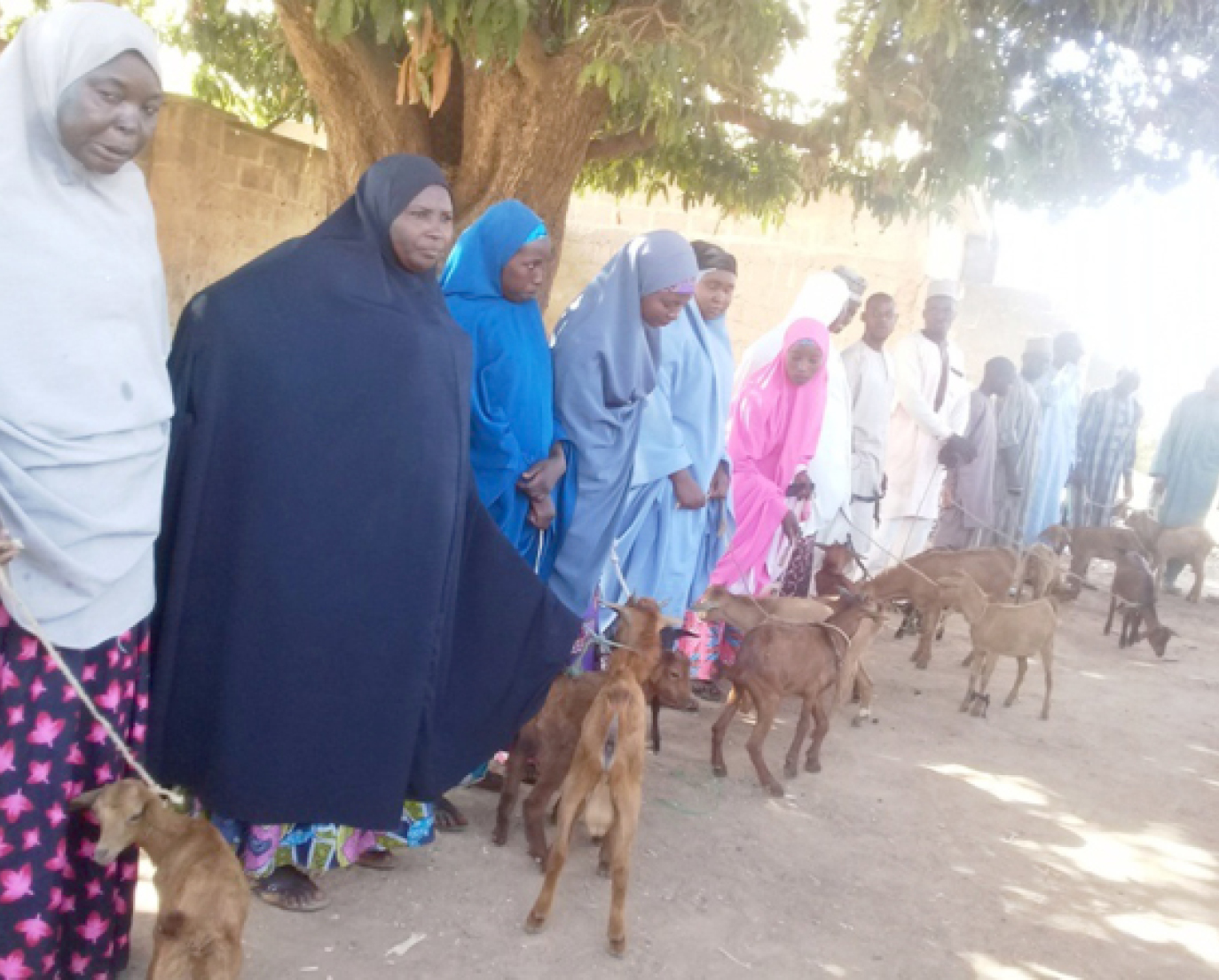One goat, many owners in Kebbi
Lami Bawa let out a sigh of relief the moment she received a goat meant to boost her livelihood from her neighbour in Wasagu, Kebbi State. Bawa said, “I have been praying to God to get something because I just sit in the house doing nothing while there are so many needs to met.” An […]

Ready to pass on the goats to neighbours
Lami Bawa let out a sigh of relief the moment she received a goat meant to boost her livelihood from her neighbour in Wasagu, Kebbi State.
Bawa said, “I have been praying to God to get something because I just sit in the house doing nothing while there are so many needs to met.”
An elated Bawa was optimistic that the asset would enhance her economic life and those of the other poor members of the community. She was happy that she had the asset to commence livestock production.
Bawa was not the only one who received a goat from her neighbour. Some other community members were also beneficiaries of the livestock transfer initiative: Pass-On-The-Gift (POTG) of the Pro-Resilience Action (PROACT) project funded by the European Union (EU) and Oxfam International to improve food security and resilience in Kebbi and Adamawa states.
Under the initiative, each of the initial beneficiaries is given a goat and 11 chickens: 10 hens and a cock. The recipients rear the goats for about a year until they reproduce and the kids will be handed over to the next vulnerable person.
Aminu Bala is another goat recipient, and he said, “Now that I have this goat, I will start rearing it. It will help me in my farming activities. It will help me to also help others so that other poor members of the community will benefit.”
Governance and Influencing Coordinator at Oxfam, Usman Faleye, revealed that, “In Kebbi, we have 30 communities and three local government areas that have benefitted, so far over 500 goats have been transferred.”
Faleye said 2,502 goats and 19,268 chickens were distributed and that after 10 months, 990 goats gave birth, 592 were transferred through POTG and a total of 3,248 goats added. For the chickens, 1,354 reproduced, 974 transferred through POTG and 32,804 added in the state.
Mallama Hadiza, one of those who Passed-On-The-Gift at Wasagu/Danko Local Government Area of Kebbi State, noted that the initiative was unifying members of the community.
Hadiza said, “My neighbour helped me in taking care of the goat because I am to hand over the kid to her.”
For many in rural communities, raising and breeding goats is a worthwhile and valuable venture.
In Jega, a goat farmer, Adamu Ali, said, “It is a profitable small farm business for us rural dwellers, and it is quite economical. Some of us raise goats for their meat, milk, hides/skin, manure, among others.
“However, many rural poor do not have the means to acquire them and that is why we are very excited about this goat transfer programme. It will no doubt help in tackling poverty in the communities.”
The Influencing Coordinator, Development Exchange Centre (DEC), the OXFAM partners in Kebbi State, Enoch Bamaiyi, explained the reason behind POTG, a component of the pro-poor initiatives under PROACT.
Bamaiyi said, “This component aims at strengthening the resilience of vulnerable households in intervention communities through increasing their assets in the form of small animals, including goats and chickens.”
He also spoke on the food loan component of PROACT, which he said was aimed at providing food for selected vulnerable households to ensure food security.
The DEC Influencing Coordinator further disclosed that a total of 3,778 selected households were supported with grains on loan basis in 2018, while a total of 150 functional community grain banks were built and were in use across three local government areas of Kebbi State.
He added that, “30 vulnerable households have been supported with milling/threshing machines, and they are improving household incomes and have diversified the livelihood of small holder farmers. This has also greatly reduced the risk of women trekking long distance to access processing facilities which expose them to security risks.”
